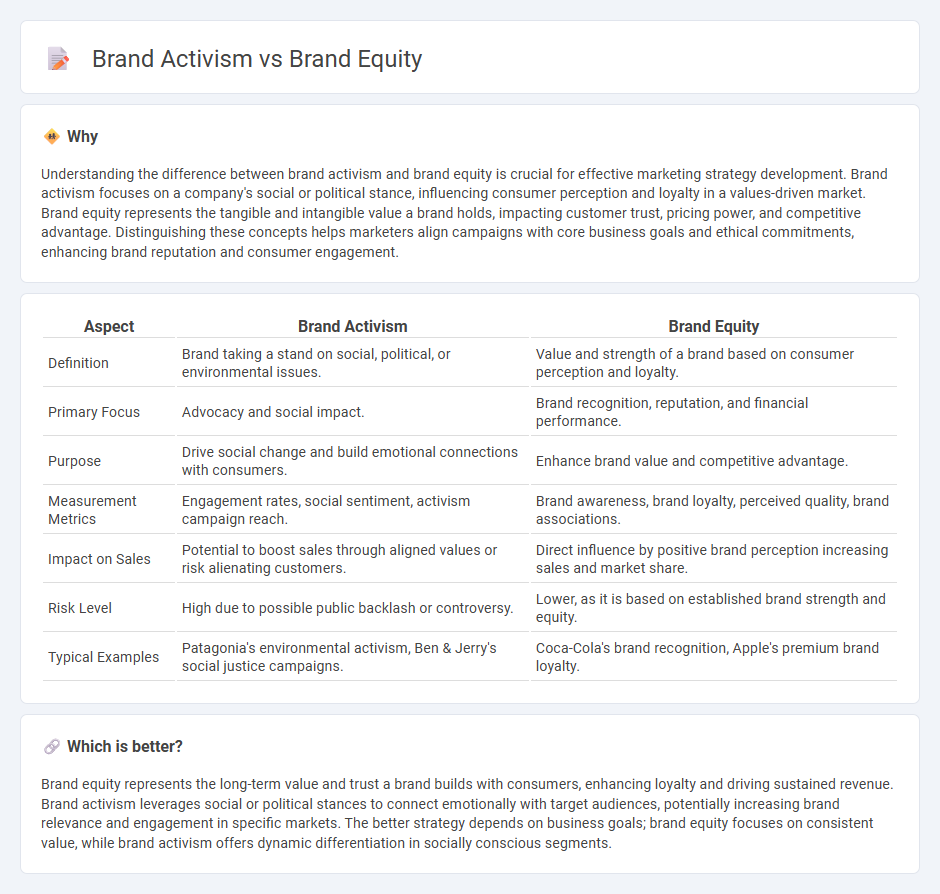
Brand activism directly aligns a company's values with social or political causes, enhancing customer loyalty and emotional engagement. Brand equity represents the overall value derived from consumer perception, recognition, and trust in a brand. Explore how integrating activism can strengthen brand equity and drive meaningful connections.
Why it is important
Understanding the difference between brand activism and brand equity is crucial for effective marketing strategy development. Brand activism focuses on a company's social or political stance, influencing consumer perception and loyalty in a values-driven market. Brand equity represents the tangible and intangible value a brand holds, impacting customer trust, pricing power, and competitive advantage. Distinguishing these concepts helps marketers align campaigns with core business goals and ethical commitments, enhancing brand reputation and consumer engagement.
Comparison Table
| Aspect | Brand Activism | Brand Equity |
|---|---|---|
| Definition | Brand taking a stand on social, political, or environmental issues. | Value and strength of a brand based on consumer perception and loyalty. |
| Primary Focus | Advocacy and social impact. | Brand recognition, reputation, and financial performance. |
| Purpose | Drive social change and build emotional connections with consumers. | Enhance brand value and competitive advantage. |
| Measurement Metrics | Engagement rates, social sentiment, activism campaign reach. | Brand awareness, brand loyalty, perceived quality, brand associations. |
| Impact on Sales | Potential to boost sales through aligned values or risk alienating customers. | Direct influence by positive brand perception increasing sales and market share. |
| Risk Level | High due to possible public backlash or controversy. | Lower, as it is based on established brand strength and equity. |
| Typical Examples | Patagonia's environmental activism, Ben & Jerry's social justice campaigns. | Coca-Cola's brand recognition, Apple's premium brand loyalty. |
Which is better?
Brand equity represents the long-term value and trust a brand builds with consumers, enhancing loyalty and driving sustained revenue. Brand activism leverages social or political stances to connect emotionally with target audiences, potentially increasing brand relevance and engagement in specific markets. The better strategy depends on business goals; brand equity focuses on consistent value, while brand activism offers dynamic differentiation in socially conscious segments.
Connection
Brand activism strengthens brand equity by aligning a company's values with socially relevant causes, fostering deeper emotional connections with consumers. Brands that actively support social and environmental issues often experience increased loyalty, trust, and positive perception, key components of brand equity. This alignment drives customer engagement and long-term financial performance by differentiating the brand in competitive markets.
Key Terms
Brand Equity:
Brand equity represents the value a brand adds to a product or service, driven by consumer perception, recognition, and loyalty. It encompasses tangible elements like logos and slogans, as well as intangible factors such as trust and emotional connection. Explore how cultivating strong brand equity can elevate market position and long-term business success.
Brand Awareness
Brand equity significantly benefits from strong brand awareness, as it measures consumer perceptions, loyalty, and overall value associated with a brand, directly influenced by recognizable logos, consistent messaging, and positive experiences. Brand activism leverages brand awareness to engage audiences by championing social, environmental, or political causes, thereby enhancing emotional connections and differentiating the brand in competitive markets. Discover how integrating brand awareness strategies with activism efforts can amplify your brand's impact and equity.
Perceived Value
Brand equity is primarily driven by perceived value, encompassing customers' trust, quality recognition, and emotional connection with the brand. Brand activism enhances perceived value by aligning the brand with social causes, which deepens customer loyalty and distinguishes the brand in competitive markets. Explore how integrating brand equity and activism strategies can amplify your brand's perceived value and market impact.
Source and External Links
What Is Brand Equity? How To Build Brand Equity (2025) - Shopify - Brand equity is the market strength or value a brand accumulates based on people's perceptions, influencing customer loyalty and pricing power, and it grows over time through quality experiences and strategic marketing.
Brand Equity Guide - DesignRush - Brand equity refers to the value of a brand influenced by consumer perceptions and can be built by increasing brand awareness, communicating meaningful brand messages, generating positive responses, and fostering strong customer relationships.
Brand Equity: What It Is, Why It Matters & How to Build It - Frontify - Brand equity is the value customers place on a brand based on perceived quality and experience, yielding benefits like higher pricing power, customer loyalty, trust, and resilience against market shifts.
 dowidth.com
dowidth.com